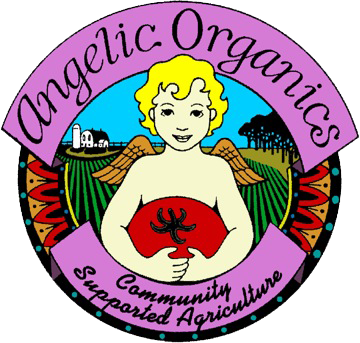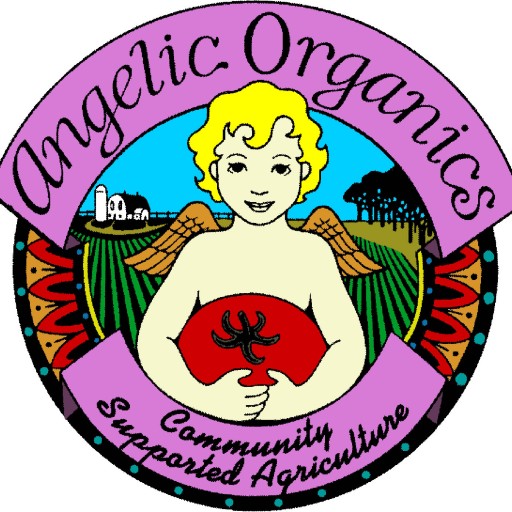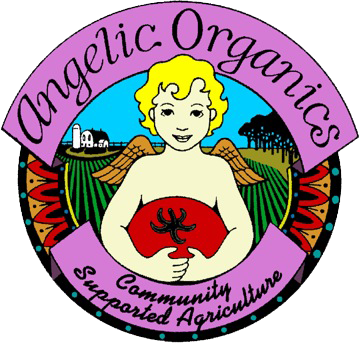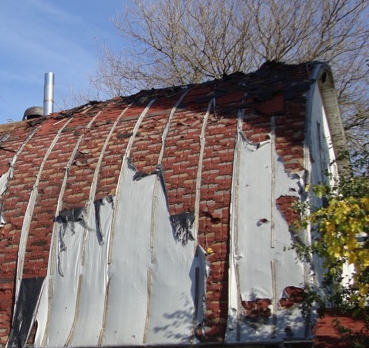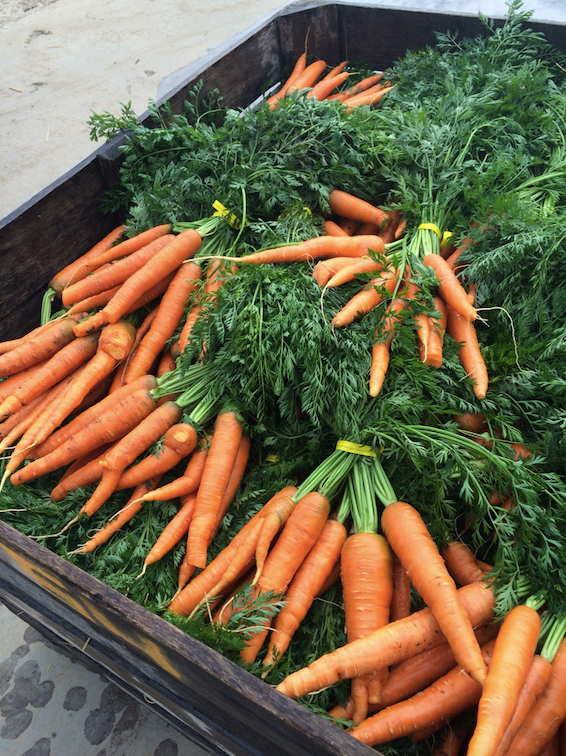Farmer John Writes: About Money
Welcome to our Eighth Harvest Week
Our Field Day
Our Field Day last Saturday got me to thinking about money. (Discussing money with people is often akin to talking about their bathroom habits…here goes.)
The Land Acquisition
Angelic Organics needed more land to farm in the 90’s. When the land right next door came up for sale (it sits about 25 feet north of our main barn), I didn’t have the money to buy it. Many of our shareholder families came together to purchase it and lease it back to the farm. This made a huge difference: made it so we could feed thousands more people, made Angelic Organics more secure, allowed us to hire more workers and pay our veteran workers more money. It was not just affluent people who made this deal happen; some less wealthy shareholders scraped money together for this cause that they believed in. We had a ceremony 16 years ago commemorating the land purchase by cutting the woven wire fence that separated the newly acquired land from the Angelic Organics farmstead.
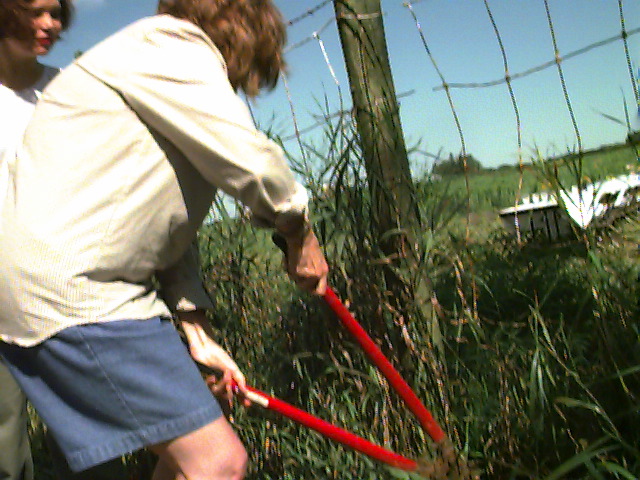
1999: Breakfast on the new land awaits the shareholder investors, once the fence is cut. Lisa Hish observes while Cindy Duda cuts the fence.
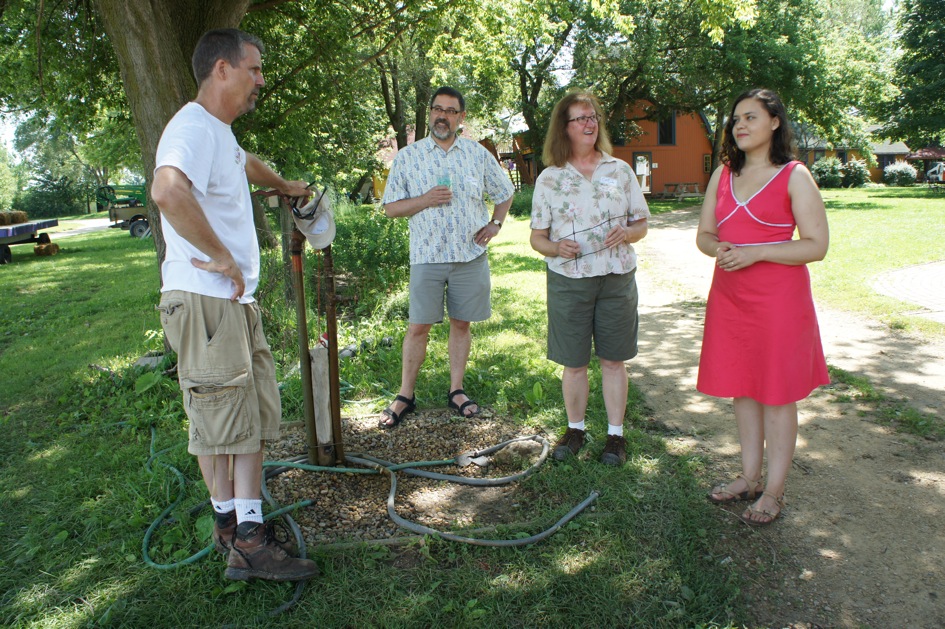
2015: Tom Spaulding (left) stands on the land that the Angelic Organics investors acquired. Brian Herner, Cindy Duda, and Haidy Peterson stand on the land that is part of the original Angelic Organics farmstead. Cindy holds a piece of the fence that she cut 16 years ago, uniting the two pieces of land.
Rudolf Steiner
Rudolf Steiner, founder of Anthroposophy, including Waldorf Education and Biodynamic Agriculture, understood money to be a bridge – a circulatory system – invented to connect human beings in relationships of service.
My Mom
The Handyman and the Widow
Some of you personally met my mother during the early years of Angelic Organics. Many of you encountered her in the film The Real Dirt on Farmer John. In her later years, when a plumber came to her home to do repairs, he tried to undercharge her, in light of that she was a widow living in a modest house.
My mom said, “Are you kidding? You can’t come out here and do that work for that little money. Give me a bill for the right amount. You’ve got to take care of your family. You have bills to pay. People need money.”
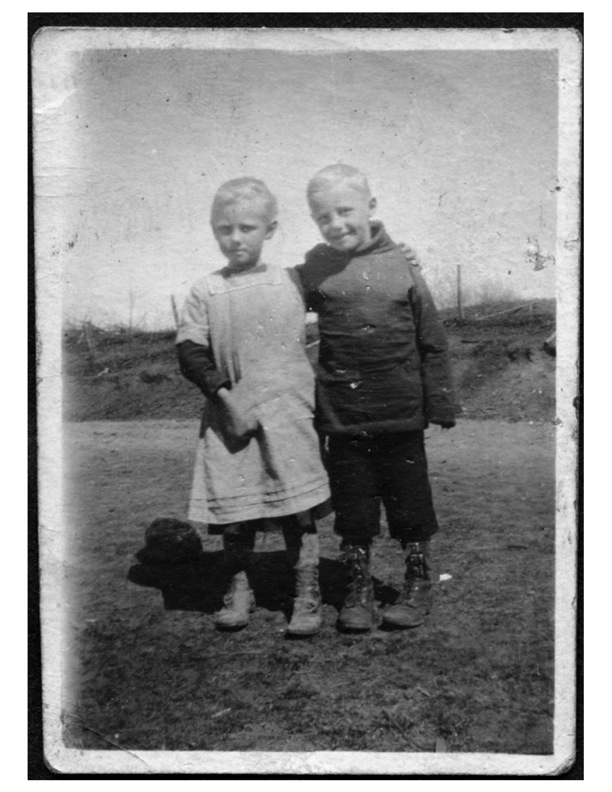
My mom Anna and her twin brother Alfin, early 1900’s. (They grew up just down the road from Angelic Organics.)
The Weigh & Pay
My mom got too sick to regularly go out to her vegetable stand in her front yard, The Weigh and Pay, to make change for customers. Generally, when she couldn’t tend the stand to make change, it operated on the honor system. People could insert bills into a slit in a lockbox that was bolted to the table, and there was also a jar in which there were small amounts of bills and coins to help people make change. My mother didn’t like to lock the lockbox, because she knew some people might only have a twenty dollar bill and would need to make change when purchasing their vegetables. I insisted that she lock the box when she couldn’t be there, because quite a bit of money would accumulate in it during a busy sales day. She finally agreed to lock the lockbox.
One day, I went down to the stand to replenish the vegetables. I tugged on the lid to the lockbox and felt relief that it was finally locked. Then I noticed with a start that the key to the lockbox sat right beside the box. I went into my mom’s house and said, “great that you are locking the box now, but you forgot to take the key into your house.”
She said, “I know that you want me to keep the box locked, so I am, but how are people going to make change if they can’t get into the lockbox?”
My Barn and the Film
Part of my dream of taking the film about Angelic Organics and my life, The Real Dirt on Farmer John, out into the world was for the film tour to raise at least enough money for me to put a new roof on our big barn. Of course, I wanted to have the story of the film do some good in the world, but financially, I wanted enough money for a new barn roof. My beloved barn was leaking terribly when the tour started, and I knew that it would only be a matter of a few more years before the barn could not be saved. I even thought that perhaps the tour would be so successful that I could put needed roofs on even more of the farm buildings and do much needed infrastructure repairs. Alas, the tour did not provide the money for even a new barn roof. I suspect the main reasons why can be discerned from these typical (somewhat paraphrased) encounters during the tour.
1) A Film enthusiast approached me, grinning, “Hey, Farmer John. I found your film for free on the internet…isn’t that great?”
I replied, “Not so sure it’s great. I was hoping to get enough royalties from the film to replace my barn roof.”
The film enthusiast scowled and said, “that film should be free. It’s such an important story. Everyone should be able to see it for nothing.”
2) An activist approached me, “Please come and present about sustainability to our group. We’re about 200 miles from here. We’re a non-profit. We don’t have any money for your expenses.”
I replied, “I’m supposed to pay my way there, put myself up and present for free? Do you think that’s sustainable? ”
“The world needs to hear your message, and you owe it to the world to get your message out. Maybe we can pool our money and buy you dinner when you come.”
Workers and Pay
Sometimes, I am told that if I just pay my new workers more, they will work better and faster.
I reply, “my long-term workers, who get paid considerably more than the beginning workers on the farm, never became more conscientious or hard-working because I raised their pay. They were already conscientious and hard-working, and therefore I raised their pay. They work with the same amount of integrity and dedication now that they brought to the job their first day here; the only difference between then and now is that now they are more experienced.”
I continue, “I promise you that new workers will not work one bit better or faster if I raise their pay; they will work the way they are working now.”
The Airlines
Bob Bower, who many of you recall as the general manager at Angelic Organics for many years, and I didn’t typically shop for the best deal. We both recognized that businesses need money to stay in business, and we endeavored to support businesses in their goals of staying in business. In the 90’s, when the airlines were in another of their struggles to survive, Bob and I needed tickets for a flight.
Bob, on phone with airline representative: “So that will be $310 per ticket then? The other passenger, John, and I would like to pay $30 more than that, because we know your company is struggling and we’d like to help out.”
(pause while airline representative replied to Bob’s request)
Bob:“We can’t do it? But we want to help.”
(another phone pause)
“No way, huh? Your system won’t allow it. Okay, then, but you really should set up your ticket system so people can pay a little more if they want to.”
The Tree Cutters
After the storm last week, three husky young men stopped by with a lot of tree cutting equipment in tow, wondering if I would hire them to cut up the trees that the storm had felled.
“How much?” I asked.
“$1100,” the foreman said.
I looked at the trees, then at the men.
I said, “you might be making a little extra on this job at $1100, but here are the facts. There are 3 of you. You all have to get paid for your time. And look at all the equipment you have to keep going. One small repair for that equipment might cost you the whole $1100. So, $1100 is fine.”
A few hours into the job, a gearbox on the boom truck went out. The foreman went to town to buy another one.
“$1100 for that gearbox,” he told me.
I said, “You guys come out here. You work hard. You do risky work all day long. And the exact whole payment for your services here goes into one repair. But you still have to take care of your families. You still have to eat.”
New York
I was staying in an apartment complex in New York City. One morning, I ventured out for a day of urban discovery. I thought I had an envelope with me containing several twenty dollar bills, but alas, it was not with me. I assumed it had fallen out of my pocket during my explorations. Upon returning to the apartment building, I saw the envelope on a table in the foyer with this message written on it: “Someone in our building must have dropped this envelope on their way out.” All the bills were still in it. There it sat, all day long, people coming and going past it, some of them for sure noticing it, reading the note and thinking “it’s not mine.”
Community Supported Agriculture and Money
Rudolf Steiner, who could arguably be credited with the inspiration for the Community Supported Agriculture model, said that to understand and honor the needs of the other is of primary importance at this stage in the unfoldment of humanity–that our tendency towards self-centeredness needs to be mitigated with a an understanding of and genuine concern for the needs of the other. Steiner said that what happens between two human beings today is the new temple.
An overly-simplified summary of the Community Supported Agriculture model is that the farmer should strive to keep prices low to make sure that the farm’s shareholders can receive healthy, affordable food, and the shareholders should strive to keep prices high to make sure the farmer can take care of all the farm’s needs. The farmer looks out for the shareholders; the shareholders look out for their farmer. In this light, the Community Supported Agriculture model has the possibility of being a cultural, social, and economic temple.
Upcoming Crops
The sweet corn has just been inching its way along. It needs high temperatures to sweeten up properly, but it will still be good corn if it ripens in the low 80’s.
The Weather
The weather gave us a break last week…low 80’s, finally dry at the end of the week.
Past Crops
Sign up for the Free Recipe Service
Make sure you sign up for the Local Thyme recipe service we offer with this year’s share. It received many great reviews from our shareholders last season. Go to www.localthyme.net/register. Enter the farm code AOLTFREE under “I am a member of a CSA farm.” Click the sign-up button.
Let us Know
Let Shelly know anything you’d like to share about this week’s box email hidden; JavaScript is required. Please note the week and day of delivery, your site, when you picked up your box, and any comments about your box.
Please Fold Your Boxes Properly and Return Them
The farm re-uses the vegetable boxes. Flaps are easily torn when the boxes are dismantled improperly, and then the box bottom might later burst open with fresh, organic local produce heading towards the floor. Please return your empty, flattened vegetable box to your delivery site. If you receive home delivery, place it in the location where your box is delivered.
More from Shareholders
Visit us often at www.facebook.com/angelicorganics, where we post exciting farm developments regularly, and shareholders post recipes, tips, and photos.
Saturday’s Box Contents:
Please Note: This summary is written before you receive your box—be aware that some guesswork is involved. As always, be sure to thoroughly wash all of your vegetables.
Fruiting Crops – sweet corn, cucumbers, zucchini, eggplant
Cooking Greens – kale
Alliums – onions
Herbs– parsley
Salad Greens – lettuce
Your Farmer, John
Wild Edibles Weekend at the Angelic Organics Learning Center! August 8, 9
Join us for Wild Edibles Weekend! On August 8-9, you’ll learn to identify, harvest and prepare wild plants from forests, wetlands, fields, and even lawns. More information and register online at learngrowconnect.org/events.
